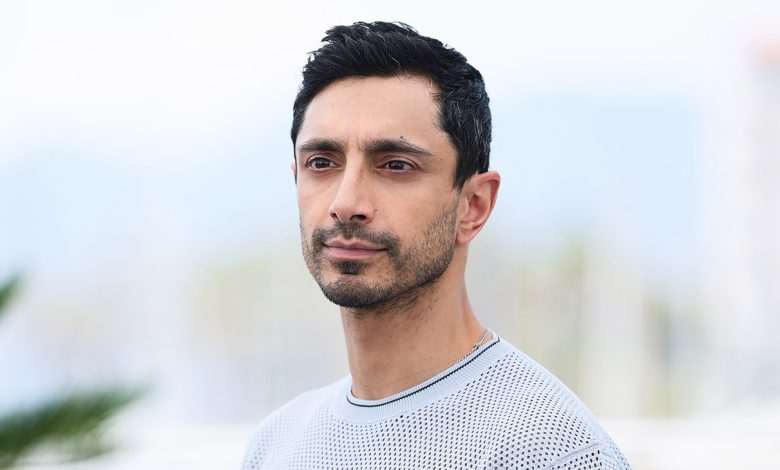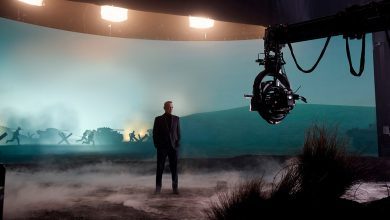Riz Ahmed Talks Relay, Not Being in Andor

In the spring of 2023, Riz Ahmed and his family were robbed just as he was beginning to film David Mackenzie’s Relay in New York City. As new parents in the middle of a cross-country move, it was a heartbreaking moment in time for Ahmed and his wife, but the real-life misfortune provided him with plenty of creative motivation for his enigmatic character named Ash.
In Mackenzie’s ‘70s-inspired paranoid thriller, the Oscar winner plays a former failed whistleblower who’s now devoted his life to protecting other potential whistleblowers from the duplicity of their corporate overlords. But instead of helping people blow the whistle publicly, he methodically puts the genie back in the bottle for his clients. The reason being is that would-be whistleblowers often get cold feet due to the threats and intimidation they’re forced to endure from entities tied to their current or previous employer.
Thus, Ash will anonymously broker settlements between both parties by way of operators at a relay call center. The company in question gets their incriminating documents back, while their former employee receives hush money. Additionally, Ash will carefully protect his client during their subsequent relocation, and he’ll safely store a copy of the company’s sensitive documents so that leverage is upheld and the agreement is honored long-term by all those involved.
Consequently, the part struck a chord with Ahmed at the time since Ash provides services his family would have benefited from during their own relocation.
“All our belongings and prized possessions were robbed on a truck that was moving from California to New York. We just had a baby, and so all of our photos and memory cards and really precious items were robbed,” Ahmed tells The Hollywood Reporter in support of Relay’s Aug. 15 theatrical release.
To communicate, Ash transmits messages from a telecommunications device for the deaf (TDD), and the fictitious Tri-State Relay Service then reads his outgoing messages to both parties during settlement negotiations. As a result, Ahmed often worked by himself and acted off of the messages his character’s TDD would receive. Sometimes, an assistant director would also read the incoming messages from another character, such as Lily James’ Sarah Grant, whose case tests Ash’s abilities in newfound ways.
And when Ahmed’s family’s robbery case became too much to bear, the same AD would read him updates during downtime.
“Sometimes, I would have the assistant director read out the email or the list of things stolen, or the latest text message from the person that was investigating,” Ahmed shares. “So that experience gave me a way into this character that was very visceral and honest. And I’m just going to be real with you, that’s partly why this film means so much to me. We, as a family, were living through a similar version of loss and loss of control that my character was dealing with.”
In 2013, Ahmed met the Gilroy family on the set of Dan Gilroy’s masterwork, Nightcrawler. Dan’s twin brother, John Gilroy, edited the Oscar-nominated pic, and their older brother, Tony Gilroy, produced it. Dan’s wife, Rene Russo, also starred alongside Ahmed and Jake Gyllenhaal. The British actor would then reunite with Tony three years later when the latter was brought on to helm Rogue One: A Star Wars Story’s substantial reshoots.
Tony Gilroy would go on to create and showrun Rogue One’s acclaimed prequel/spinoff series, Andor. Dan and John were also involved as writer and editor-producer, respectively. Ahmed and Tony eventually discussed whether Ahmed’s whistleblowing pilot character, Bodhi Rook, would make an appearance, but the math didn’t compute for Gilroy. After all, he was always very disciplined when it came to returning characters and fan service, and Ahmed is glad that Gilroy didn’t force him into an already masterful equation.
“I actually brought this up with Tony, jokingly. I was like, ‘Does that mean I’m getting a Bodhi Rook standalone movie?’” Ahmed recalls mid-laugh. “But he’s got such an intricate way of plotting things, and he felt that bringing my character in would mess with timelines and the way he’d plotted lots of stuff through. But as a fan, I think Andor is kind of perfect, so I wouldn’t mess with it or have it any other way.”
Below, during a recent conversation with THR, Ahmed also discusses the ever-increasing relevance of Relay, before addressing his upcoming involvement in Alejandro González Iñárritu and Tom Cruise’s untitled film for Warners.
***
When you first realized that your Relay character doesn’t speak out loud until the 30-minute mark, did that pique your interest even more?
Absolutely, yeah. You hit the nail on the head. As a reader turning every page, I was trying to work this character out and understand where he’s coming from and why he’s doing the things he’s doing. So it really kept me on the edge of my seat, and hopefully, the audience watching the movie will feel the same way. It’s a really bold master stroke from [director] David Mackenzie and [screenwriter] Justin Piasecki to create this character who can really draw us in with so little. The nature of what he’s doing is itself intriguing, and actions speak louder than words. “Show, don’t tell” is just a very bold, cinematic decision to make.

Riz Ahmed’s Ash in David Mackenzie’s Relay.
Courtesy of TIFF
To borrow the movie’s frequent question, have you received a relay call before?
I haven’t, but back in the day, they used to have something called a “reverse charge call.” [Writer’s Note: This is the U.K.’s version of a collect call.] So, as a kid, I made a bunch of reverse charge calls when I was stuck in the middle of nowhere. I’d make a reverse charge call to my brother, going, “Can you pick me up? I’ve just been dropped off at the wrong bus stop.” But I haven’t been on a relay call.
Ash uses ASL around a deaf friend of his, so do you think that’s who introduced him to the relay service and the telecommunication device he uses to communicate with his clients?
Yes, that was our thinking. This is a character who, by his very nature, is a bit guarded and a bit quiet. He doesn’t speak a lot, and it made sense to us that he got this machine from a friend of his who is deaf. It suddenly unlocked the character and how he’s most comfortable communicating without [spoken] words.
Also, there’s a connection that ASL gives you. ASL is communicating in a very physical way. My sign language instructor once told me that there’s dishonesty in words. People hide behind words. But communicating with ASL, because it’s so visceral and so embodied, there’s no hiding. So we figured that he and his friend have this silent but honest and intimate connection from their method of communication, and that’s also where he got the relay machine.

Riz Ahmed’s Ash in Relay
Bleeker Street
Ash has a somewhat similar backstory to your character in The Reluctant Fundamentalist (2012). Both lived in New York during 9/11, both worked on Wall Street and both became disillusioned with their line of work. Thus, could you quickly understand why Ash created this methodical, isolated world for himself?
That’s a really interesting connection that, to be honest, I hadn’t thought of in those terms. That’s an experience that so many people have, right? So many people have been shaped by world events, and the world changed in that way at the turn of the century. So many people have also chased this ambition and materialism only to realize that it doesn’t bring you happiness. So I tried to find a specificity in both of those characters, but stupidly, I didn’t join those dots until you said it just now.
There’s something very intriguing about why Ash is the way he is, and there’s this idea that a cynic is just a wounded idealist. Ash himself was a [failed] whistleblower. Ash himself was somebody who tried to do the right thing and go up against the system, but the system broke him and his faith in the world. So now his way of trying to do the right thing isn’t by changing the world; it’s by protecting people who are naive enough to think they could also change the world. It’s a version of going back to help himself seven years ago.
So there’s something very cathartic and healing about that role he’s taken on, but in many ways, he’s also getting caught in a loop. He’s reliving, through other people, a decision he wished he made. So it really takes the journey of the film and his relationship with Lily’s [James] character for him to break free of that loop and take a big swing to find a new answer to the question, “What are you willing to risk to do the right thing?”
Whether it’s helmets and hats or very elaborate disguises, Ash camouflages himself in public. And being a recognizable actor, I have to imagine that you’ve learned how to be incognito at times. Have you never gone to Ash’s extremes, though?
(Laughs.) I’ve never walked around with a fake beard, but I do wear hats a lot, to be honest. (Ahmed holds up a nearby hat.) I like to think that I wear hats because I like hats, but if I don’t wear a hat, I do sometimes draw a bit more attention. So you’re right in that I do sometimes hide, not just in terms of being recognized as an actor in public, but in terms of being a bit guarded. I could really relate to the character in that way. He sometimes keeps people at a distance, and for different reasons, I’ve found myself doing the same thing. We all do that in different ways. So that sense of hiding in plain sight, that sense of wearing a mask, that sense of either figuratively or literally disguising yourself in public, I can definitely relate to that. And that’s partly why I wanted to explore this role. I’m always interested in taking on roles that force me to confront something in myself.

Riz Ahmed’s Ash in Relay
Bleeker Street
For the unusual phone conversations, Lily James told me that another actor was present off camera to read the lines that your character transmitted via the relay operator. Did you just work off of the device’s messages in front of you? Or did someone read out of frame for you?
It was often a combination because sometimes the machine didn’t work. So we’d have someone reading off camera, or, because of the pacing of how David wanted to cut, we couldn’t wait for every word to come through off camera. So I would actually ask them to read a variety of different things.
At one point, a very strange thing happened where art and life mirrored each other. In this film, I play the role of someone whose job it is to take care of vulnerable people and their prized possessions as he moves them safely from A to B. And when I was actually starting to film this, we got robbed as a family. All our belongings and prized possessions were robbed on a truck that was moving from California to New York. We just had a baby, and so all of our photos and memory cards and really precious items were robbed. And it was like, “Wow, this is exactly like the role that I’m playing.”
Sometimes, I would have the assistant director read out the email or the list of things stolen, or the latest text message from the person that was investigating. So that experience gave me an overlap and a way into this character that was very visceral and honest. And I’m just going to be real with you, that’s partly why this film means so much to me. We, as a family, were living through a similar version of loss and loss of control that my character was dealing with.
I appreciate how Relay flirts with a more conventional ending until it takes a hard left turn. Do you think you still would’ve been interested in making this movie if it took the more traveled path?
What was the conventional ending you had in mind?
[Note: I then went off the record to explain in spoiler terms what I meant.]
I think that wouldn’t have been as interesting.
I agree.
I think we’ve done something a bit more interesting here, but it’s tricky because we can’t really talk about it much. I love a twisty thriller, and this one is full of twists and turns. That makes for the kind of movie that people want to discuss afterwards: “What did you think about this? What do you think that meant? Did you see this coming?” It’s fun.
Part of me wants to see a spinoff about the relay operators and how they discussed their crazy calls amongst themselves in their break room.
It’d be a workplace comedy where they’re all by the water cooler, and all of a sudden, someone gets a call and [casually] goes, “Oh, it’s a bank robber threatening someone.” What would the plot line be?
At some point, one of them would get involved to protect someone or stop something awful from happening, although that’s more in line with Relay’s tone.
Yeah, the kind of stuff they listen to [warrants that].
Real-life fixers probably don’t make themselves readily available, but were you able to connect with anyone who helps whistleblowers reverse course?
We spoke to a lot of whistleblowers, and we spoke to a lot of people that help whistleblowers. A lot of them were people in the legal field, or they were Michael Clayton-esque in a way. They were people who are on retainers at law firms. So I didn’t meet anyone in particular who was doing exactly what my character was doing, but I did speak to people whose job it was to help, shepherd, guide and protect whistleblowers through the law and also through other creative means, like putting them on a plane, changing their address and acting as their go-between with the authorities or their employers. It was interesting.
We obviously took some poetic license or an imaginative leap, but a lot of what we were portraying is grounded in truth. Corporate espionage and extortion is a real thing, and in many ways, it’s the kind of power that we have to contend with now.

Riz Ahmed’s Ash in Relay.
Bleeker Street
Overall, I admire how Relay explores the push-pull between the guilt of settling for personal gain versus not settling in order to protect untold amounts of people from further damage. It’s a tough question for any potential whistleblower.
Yeah, and it’s a very resonant question. I think so many people are asking themselves, “What am I willing to risk to do the right thing?” In so many ways, the world feels like an unjust place right now, an unfair place, an unequal place. So we have to ask ourselves, “What are we willing to do to make it better?” Are we willing to put the little that we have at risk or the plenty that we have at risk? This is one of the main questions of our time. Solutions usually involve sacrifice in some form or another. So I was really intrigued by that, and I really loved that the film was getting at that really deep, zeitgeist-y question, but in a classic, edge-of-you- seat, cat-and-mouse thriller. I found that to be entertaining and also really thoughtful.
This is the part where I unnaturally force Star Wars into the conversation. You worked with the Gilroy family on Nightcrawler …
And I worked with Tony Gilroy extensively on Rogue One [during additional photography].
So did you ever expect your number to be called for Andor?
I actually brought this up with Tony, jokingly. I was like, “Does that mean I’m getting a Bodhi Rook standalone movie?” (Laughs.) But he’s got such an intricate way of plotting things, and he felt that bringing my character in would mess with timelines and the way he’d plotted lots of stuff through. But as a fan, I think Andor is kind of perfect, so I wouldn’t mess with it or have it any other way.
Someone who did call your number was Alejandro González Iñárritu. What vague adjectives can you offer about your experience on his upcoming movie (with Tom Cruise)?
None whatsoever.
It’s one of those, huh?
He’s such a special director, and it’s such an interesting story he’s telling that I don’t want to ruin the surprise for anyone.
***
Relay opens Aug. 22 in movie theaters.
Source: Hollywoodreporter
HiCelebNews online magazine publishes interesting content every day in the movies section of the entertainment category. Follow us to read the latest news.
Related Posts
- Carol Altieri, Former CBS Executive, Dies at 76
- Courtesy of A24
Share on Facebook
Share on…
- Why Do Sketch Comedians Keep Getting Snubbed by the Emmys?
- ‘Peacemaker’ Is Back for Season 2: Here’s Where and When to Watch the DC Comics Series Online
- Santa Barbara Film Fest: ‘Wicked’ Star Cynthia Erivo Tapped for Kirk Douglas Award





